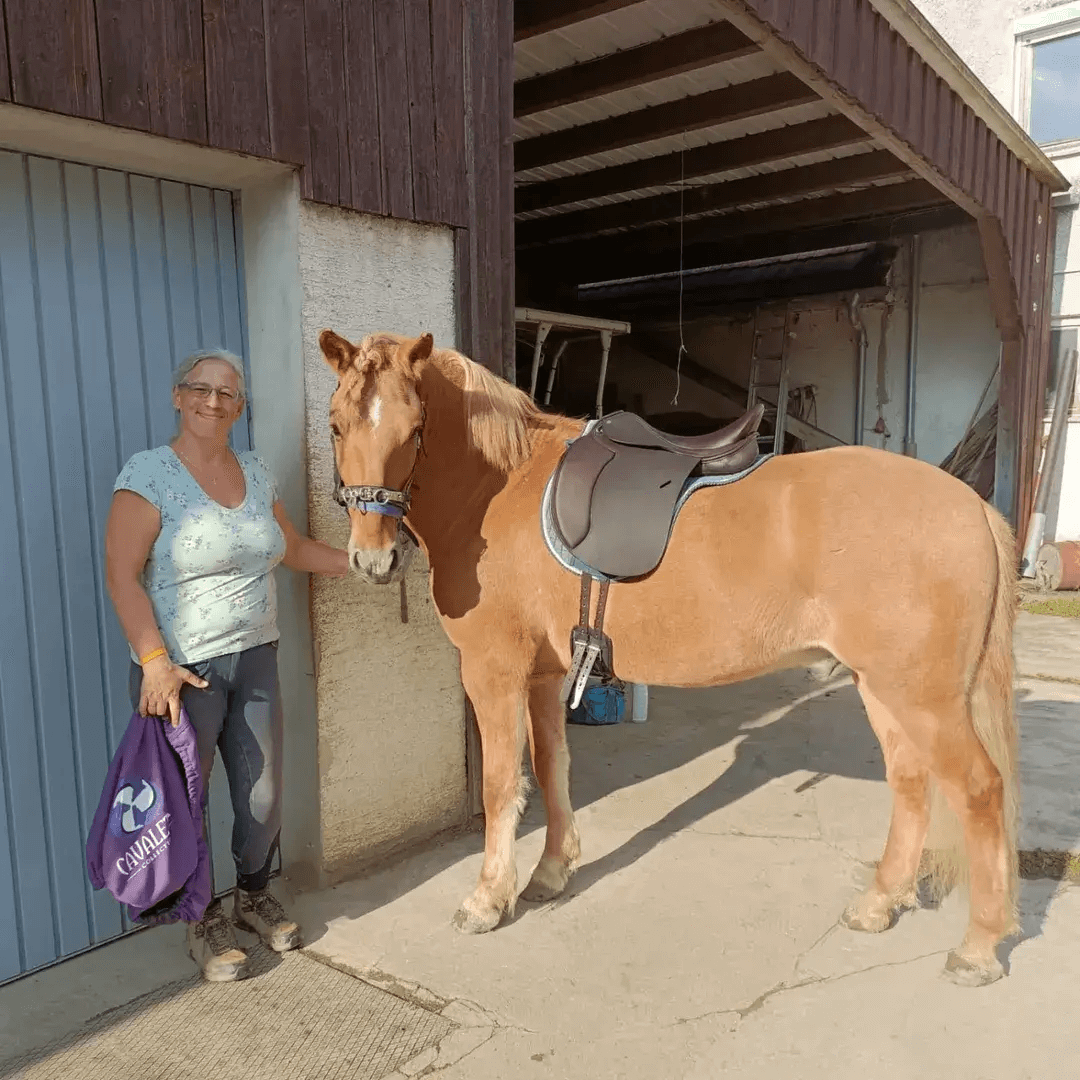How To Keep Your Horse Warm In The Winter Months
How To Keep Your Horse Warm In The Winter Months

Problems caused by your horse getting too cold
As the winter months approach, it is essential for horse owners to be aware of the potential problems that can arise when their equine companions get too cold. Horses are naturally adapted to withstand colder temperatures, but extreme cold can still pose several health risks.
Here are some of the problems that can be caused by a cold horse, as well as some tips on how to keep your beloved equine friend warm and healthy during the chilly winter season.
Just like humans, horses are susceptible to hypothermia if exposed to extreme cold for extended periods. When a horse's body temperature drops too low, it can lead to a range of symptoms, including shivering, lethargy, weakness, and even loss of consciousness. If left untreated, hypothermia can be life-threatening. To prevent this, it is crucial to provide your horse with adequate shelter, warm bedding, and suitable winter clothing such as blankets or rugs.
-
Respiratory Issues:
Cold air can negatively affect a horse's respiratory system, particularly if they are exposed to drafts or damp conditions. Horses may develop respiratory problems like coughing, nasal discharge, or even bronchitis. To minimize the risk, ensure your horse has access to a well-ventilated but draft-free shelter. Avoid confining them in poorly ventilated areas, as this can increase the concentration of airborne irritants and exacerbate respiratory issues.
-
Muscular Stiffness and Injury:
Cold temperatures can cause a horse's muscles to become stiff, increasing the risk of injuries such as strains or sprains. When horses are cold, their blood vessels constrict, reducing blood flow to the muscles and making them more susceptible to strains. Providing your horse with regular exercise and warm-up routines can help prevent these issues. Additionally, consider using appropriate equine warming products, like leg wraps or warm-up creams, to support their muscles during colder weather.
-
Decreased Water Consumption:
Horses tend to drink less water during colder months, which can lead to dehydration and subsequent health problems. Cold water can be unappealing to horses, so ensure they have access to fresh, tepid water at all times. Consider using heated water buckets or tank heaters to prevent water from freezing and encourage your horse to drink regularly.
-
Weakened Immune System:
Cold weather can weaken a horse's immune system, making them more susceptible to illnesses and infections. To support their immune health, provide a balanced diet rich in nutrients, including vitamin E and selenium. Regular veterinary check-ups and vaccinations are also essential to ensure your horse's immune system is functioning optimally throughout the winter months.
Keeping your horse warm during winter is crucial to prevent potential problems caused by extreme cold. By providing adequate shelter, and appropriate clothing, and ensuring access to fresh water, you can help protect your horse from issues like hypothermia, respiratory problems, muscular stiffness, decreased water consumption, and weakened immune systems.
Remember, a healthy and comfortable horse will lead to a happier and more enjoyable winter season for both of you!
Why it is important to keep your horse warm
As the winter months approach, it is crucial for horse owners to pay extra attention to their equine friends' well-being. Just like humans, horses also need protection from the cold weather. Ensuring that your horse stays warm during this time is not only essential for their comfort but also for their overall health and performance.
Let's delve into the reasons why it is important to keep your horse warm during the winter months.
Horses are naturally adapted to survive in colder climates. However, extreme cold temperatures can still pose a threat to their well-being. Cold weather can cause their body temperature to drop, leading to discomfort and potential health issues. By keeping your horse warm, you help them maintain their core body temperature within a safe range, ensuring their comfort and reducing the risk of hypothermia.
-
Preventing Respiratory Problems:
Cold air can be harsh on a horse's respiratory system, particularly if they are exposed to it for extended periods. When horses breathe in cold air, their airways can constrict, leading to respiratory issues such as coughing, bronchitis, or even pneumonia. By providing appropriate shelter, blankets, and warm bedding, you can protect your horse from the chilly air and minimize the risk of respiratory problems.
-
Preserving Energy and Nutrition:
Keeping warm in cold weather requires energy. Horses burn more calories to generate body heat when temperatures drop, which means they need additional nourishment during the winter months. By providing your horse with enough hay or forage, you ensure they have sufficient energy to stay warm and maintain a healthy weight. Adequate nutrition is crucial for their overall well-being and immune system, helping them fight off potential illnesses.
-
Maintaining Joint and Muscle Health:
Cold weather can make horses more prone to stiffness and muscle tension. Just like humans, horses can experience discomfort and reduced flexibility in colder temperatures. By keeping your horse warm, you help prevent muscle stiffness and minimize the risk of joint-related issues, such as arthritis. Regular exercise, proper warm-up routines, and providing adequate shelter can all contribute to maintaining your horse's joint and muscle health during the winter.
-
Enhancing Performance and Mental Well-being:
A warm and comfortable horse is a happy horse. When horses are cold, they may become irritable, less willing to cooperate, or even exhibit behavioral changes. By ensuring their warmth, you provide them with a conducive environment for mental well-being, which can positively impact their performance, training, and overall relationship with their rider.
Keeping your horse warm during the winter months is of utmost importance. By maintaining their optimal body temperature, preventing respiratory problems, preserving energy and nutrition, maintaining joint and muscle health, and enhancing their performance and mental well-being, you contribute to their overall health and happiness.
So, make sure to provide your equine companion's necessities to ensure it keeps itself warm and cosy throughout the winter!
How to keep your horse warm
As the winter months approach, it is important to ensure that your horse stays warm and comfortable. Just like humans, horses require extra care during colder weather to prevent any health issues.
Here are some essential tips on how to keep your horse warm throughout the winter months.
-
Provide Adequate Shelter:
A well-built and insulated stable or shelter is crucial for protecting your horse from harsh winter conditions. Make sure the stable is draft-free and properly ventilated to maintain a comfortable temperature. Bedding the stall with straw or shavings can also help provide extra insulation.
-
Blanketing:
Depending on the horse's breed, age, and health condition, it may be necessary to use a horse blanket. Blankets come in various weights, so choose one that suits the temperature and your horse's needs. Ensure the blanket fits properly, allowing enough room for movement without causing any discomfort.
-
Feed High-Quality Forage:
During colder months, horses burn more calories to stay warm. Including high-quality forage in their diet can help generate internal heat and maintain their body temperature. Hay is an excellent source of forage, and providing it in multiple feedings throughout the day can help keep your horse warm and satisfied.
-
Water and Hydration:
It is crucial to ensure your horse has access to clean and unfrozen water at all times. Using heated water buckets or tank heaters can prevent water from freezing. Adequate hydration is essential to maintain your horse's overall health and regulate body temperature.
-
Increase Caloric Intake:
If the temperature drops significantly, you may need to increase your horse's caloric intake to compensate for the extra energy they burn to stay warm. Consult with a veterinarian or equine nutritionist to determine the appropriate amount and type of feed for your horse.
-
Regular Exercise:
Exercise is vital for keeping your horse warm during winter months. Regular turnout or exercise sessions can help generate body heat and keep their muscles warm. However, be cautious of slippery or icy conditions to prevent any injuries.
-
Grooming:
Regular grooming not only keeps your horse's coat clean but also helps distribute natural oils, which provide insulation. Brushing your horse's coat regularly can help stimulate blood circulation and keep them warm. However, avoid excessive bathing during cold weather, as it can remove natural oils and make them more susceptible to the cold.
-
Monitor Body Condition:
Regularly monitor your horse's body condition throughout winter. If you notice any weight loss or signs of discomfort, consult with a veterinarian. They can provide guidance on adjusting your horse's diet or implementing additional measures to keep them warm and healthy.
By following these tips, you can ensure that your horse remains warm and comfortable during the winter months. Remember, each horse is unique, so it is essential to consider their individual needs and make adjustments accordingly.
With proper care and attention, you can help your horse stay cozy and thrive even in the coldest of seasons!








